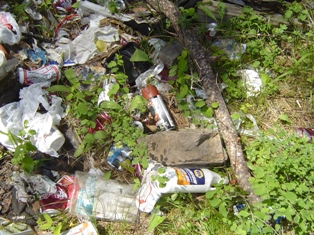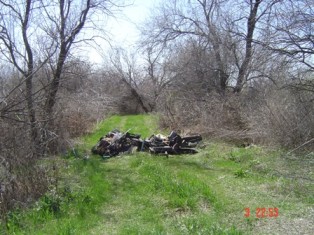Illegal Dumping activity continues to be a problem for residents of the reservation. Each year, our office field dozens of calls pertaining to illegal dumping activity. Whether it is an old refrigerator illegally dumped near Jocko streams near Arlee, to numerous bags of household waste on Terrace Lake East of Ronan, the problem continues to persist. Primarily, we have seen yard waste, wood waste, concrete, tires, and even old cars dumped illegally on tribal lands throughout the reservation.
Although, a minimal fee is required at the Lake County transfer station for some debris, typically, it can be brought to the landfill free of charge, especially if it’s of the household variety, and not commercial waste. Commercial and demolition waste, along with green yard waste and metals are permitted at the Lake County Landfill.
Contact the Lake County Transfer station at 883-7323 for more information and what can be brought to the landfill.
With all the facilities available here on the reservation and Lake County, illegal dumping shouldn’t be a problem, but it is. With your help, all of us can help curb this unnecessary dumping from occurring. When you see illegal dumping activity occurring, call your local Police Department.
Available Documents:
{rsfiles path="EP/IllegalDumping" date="0" size="0"}
Nature of the Problem
What is illegal dumping?
Illegal dumping is disposal of waste in an unpermitted area. It is also referred to as “open dumping,” fly dumping,” and “midnight dumping” because materials are often dumped in open areas, from vehicles along roadsides, and late at night. Illegally dumped wastes are primarily nonhazardous materials that are dumped to avoid either disposal fees or the time and effort required for proper disposal.
These materials typically include:
- Construction and demolition waste such as drywall, roofing shingles, lumber, bricks, concrete, and siding.
- Abandoned automobiles, auto parts, and scrap tires.
- Appliances or White Goods
- Furniture
- Yard waste
- Household trash
- Medical Waste
Wastes such as scrap tires, bulky items, and yard waste may be illegally dumped because people are too lazy to bring to the landfill or transfer station. Residential and commercial wastes may be illegally dumped in areas that lack or have costly pickup service.
Sites used for illegal dumping vary buy may include abandoned industrial, residential, or commercial buildings; vacant lots on public or private property; and infrequently used alley or roadways. Because of their accessibility and poor lighting, areas along rural roads and railways are particular vulnerable. Illegal dumping can occur at any time of day but is more common at night or in the early morning hours during warmer months.

Who dumps illegal waste?
It is difficult to profile a “typical” illegal dumper. However, offenders can include:
- Construction, demolition, remodeling, roofing, or landscaping contractors.
- Waste management companies or general hauling contractors.
- Automobile repair or tire shops.
- Scrap collectors.
- Local residents and “do-it-yourselfers”
A resident may dump wastes that did not get picked up by local waste haulers, such as bulky items, carpeting, or household hazardous wastes. In many cases, illegal dumpers are breaking other laws, relating to vehicle licensing, insurance, drug possession, or theft.

Why is illegal dumping a problem?
- Health risks associated with illegal dumping are significant. Areas used for illegal dumping may be easily accessible to people. Especially children, who are vulnerable to the physical (protruding nails or sharp edges) and chemical (harmful fluids or dust) hazards posed by wastes.
- Rodents, insects, and other vermin attracted to dump sites may also pose health risks. Dump sites with scrap tires provide an ideal breeding ground for mosquitoes, which can multiply 100 times fast than normal in the warm stagnate water standing in scrap tire casings.
- Illegal dump sites can catch on fire, either by spontaneous combustion, or, more commonly, by arson. They can also cause forest fires.
- Can impact proper drainage of runoff, making areas more susceptible to flooding when wastes block ravines, creeks, culverts, and drainage basins.
- Impact plant and wildlife.
- Runoff can contain chemicals that may contaminate wells and surface water used as sources of drinking water.
- Property values can decrease in areas located by illegal dumps.
